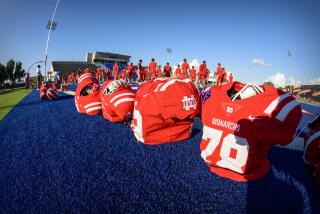LOCAL HERO PAYS PRICE : Seay Caught a Bullet and Now He Can’t Catch Passes for 49ers
- Share via
Mark Seay, who has one kidney, stood dispiritedly on the sideline at the Cal State Long Beach practice field. He is there each afternoon, hoping a judge will let him play football again.
“I’m in shape, ready to go,” he said.
But unseen beneath his shirt was the scar that reminds the wide receiver why he isn’t allowed to join the rest of the 49ers.
Seay, who lost his right kidney after he was shot by a suspected gang member at a children’s party last Halloween, was told by the university in July that he couldn’t play because the risk of injuring his remaining kidney is too great.
He has sued the school because he believes he has a right to continue to play.
“I didn’t lose a kidney playing football, I lost a kidney at home,” Seay said as he watched the recent practice. “I’ve played football 13 years and never had a bruised kidney. If I wear a flak jacket, I feel the chance of injuring the other kidney is zero.”
U.S. District Judge Ronald S.W. Lew could grant a preliminary injunction Sept. 11 that would allow Seay to rejoin the team three games into the season. If Lew doesn’t grant the injunction, the case will proceed toward trial, and Seay won’t play this year.
The major issues: Is Seay’s remaining kidney working properly? Can he play football with one kidney? Is he being discriminated against because he is handicapped? Does he have a right to make his own decision to play? Is the university motivated by a desire to protect Seay or a fear that he would sue if he played and were injured?
Lew denied Seay’s request for a temporary restraining order Aug. 25, saying it was unclear if the player’s remaining kidney is consistently functioning normally. One specialist recommends that Seay not play; another says he could be allowed to.
“In our opinion, Mark should not play even if his remaining kidney were functioning 100%,” said Deputy Atty Gen. Christopher C. Foley, who is representing the university because it is a state institution.
A polite, quiet man of 22, Seay became a hero for shielding his 2-year-old niece when a gunman standing outside fired through a window during the party in a Long Beach apartment. A bullet pierced Seay’s kidney and stopped an inch from his heart, where it is still lodged.
Seay’s attorney, Richard J. Foster, is a 49er booster and fund-raiser who had second thoughts before taking the case.
“If Mark is injured, the only person who will be more upset than me will be his parents,” he said.
Foster contends, however, that the school, by making a decision he said should be Seay’s, has violated the Rehabilitation Act of 1973, which prohibits a university that receives federal funds from discriminating against an otherwise qualified handicapped person. He said that Seay is qualified because he has the skills to play football and because the absence of a kidney “will not create an abnormal risk of injury to himself and other players.”
The attorney also said in a memo filed with the court that the National Collegiate Athletic Assn. reported that only nine kidney injuries were reported between 1985 and 1988 in Division I football. An NCAA spokesman said that of its 500 member schools, 50 in an injury surveillance program reported a total of 21 kidney injuries in that period.
Cal State Long Beach justifies its decision by contending that there is a risk of complete disability if Seay’s remaining kidney should fail, and that the kidney could fail if injured.
Seay said is he aware that he might face a transplant or have to go on a dialysis machine if he suffered a severe kidney blow.
A junior from San Bernardino who caught 31 passes for 480 yards in eight games last season, Seay was told by Athletic Director Corey Johnson and team physician Robert Austin in July that he was “medically ineligible.”
“They said I’d never be able to play again, here or anywhere,” said Seay, who has been allowed to keep his scholarship. “They said I should retire because I’m no longer in condition to play. I couldn’t understand why they said that.”
Johnson declined to comment on the case.
Seay said his parents always thought he should have stayed in baseball--he’s a former minor league player--and that they always worried when he played football.
His mother, Helen Seay, said: “I go along with what he wants and just pray for him.”
In a May letter to Johnson, Austin said that Seay’s kidney had “decreased function and is at substantial risk of compromise if further traumatized.”
Austin, on the sidelines at Veterans Stadium during a recent 49er intra-squad scrimmage, watched wide receiver Derek Washington get hit hard in the back as he came down with a pass.
“That’s why we don’t want Mark playing,” Austin said. “I’d like to have the video of that and send it to the judge.”
Besides the danger of a hard blow, Austin said that heavy physical exercise and dehydration could also cause Seay’s kidney to fail. The doctor, who said he is an expert in kidney disorders, said that improvement in Seay’s kidney was unlikely.
In March, the university sent Seay to C.C. Calescibetta, a Long Beach kidney specialist who said in a letter to Austin that “there is a concern that (Seay’s kidney) function is already compromised.”
Calescibetta determined that Seay’s creatinine clearance was 72 cubic centimeters a minute, and said that was half what it should be. (Creatinine is a byproduct of muscle metabolism and is excreted through the urine; the clearance is a measure of kidney function.)
Calescibetta said Seay should wear a flak jacket if he plays, but advised that he not play.
But another kidney specialist, Stewart W. Shankel of Loma Linda University, said in a letter to Austin: “I recommend that you honor Mark’s request. I feel that it is a risk he is willing to take and it is a very slight risk.”
Foster said that Shankel, who in July found Seay’s creatinine clearance to be 71, would testify that Seay’s kidney has stabilized and is functioning within normal limits.
After the shooting, Seay spent 2 1/2 weeks in hospitals and two months mostly resting and eating soup. He started running and lifting weights in January when he returned to classes. He is not permitted to participate in football drills, but sometimes runs with the team.
“I haven’t had much of a life since (the shooting) happened,” Seay said. “I never thought it would be like this. I feel great. You work so hard to get there and they shut the door. That’s more painful than when I was shot.”
He said he thinks about the shooting often but doesn’t feel like a hero.
“But everybody else says I am so I don’t fight it,” he said. “Kids are looking for a role model. If that’s what they want from me, that’s what I’ll be.”
Seay said he is often asked why he doesn’t forget football and just go to school.
“I’m going to get my degree, that’s not the problem,” he said. “The problem is they’ve stopped me from being out here.”
He said he would try to play at another school if he loses the case.
Seay was worried and angry that day on the practice field.
“I paid my dues,” he said. “I took my hits. I was here (in 1987) when the program was almost lost and now they can’t give me something back. I feel like I’m not getting a fair shot. They’re making out that it’s just me, that I’m not in a position to play, when what they’re afraid of is a lawsuit.”
Said Foster: “What they’re worried about is the Todd Hart case. I think the university is very nervous about liability.”
Hart, a former 49er player paralyzed during a game in 1984, received $2 million from the state to settle a lawsuit.
“We have offered to have Mark sign a document where he agrees he will not file suit if his remaining kidney is damaged,” Foster said. “But the university says waivers aren’t worth the paper they’re written on. We will draw it to any specifications they want. I think we can draft a waiver that will be enforceable.”
Foley agreed: “You could word one that would be effective.”
Foster said the case’s outcome will depend on whether Lew finds that Seay’s kidney is functioning normally. If he decides that it is, then Foster said it will likely come down to whether Seay has the right to make his own decision under the Rehabilitation Act.
“If we can’t show that Mark’s remaining kidney is operating within normal limits, then we lose and the Rehabilitation Act doesn’t apply,” Foster said.
In the meantime, the 49ers will open their season without Seay Saturday against Cal State Northridge. Quarterback Paul Oates said he hopes his receiver will be back soon.
“If he can sacrifice his life by throwing his body over that kid, then he should be able to sacrifice it for himself,” Oates said. “A man’s a man and he should be able to make his own decision.”
More to Read
Go beyond the scoreboard
Get the latest on L.A.'s teams in the daily Sports Report newsletter.
You may occasionally receive promotional content from the Los Angeles Times.










